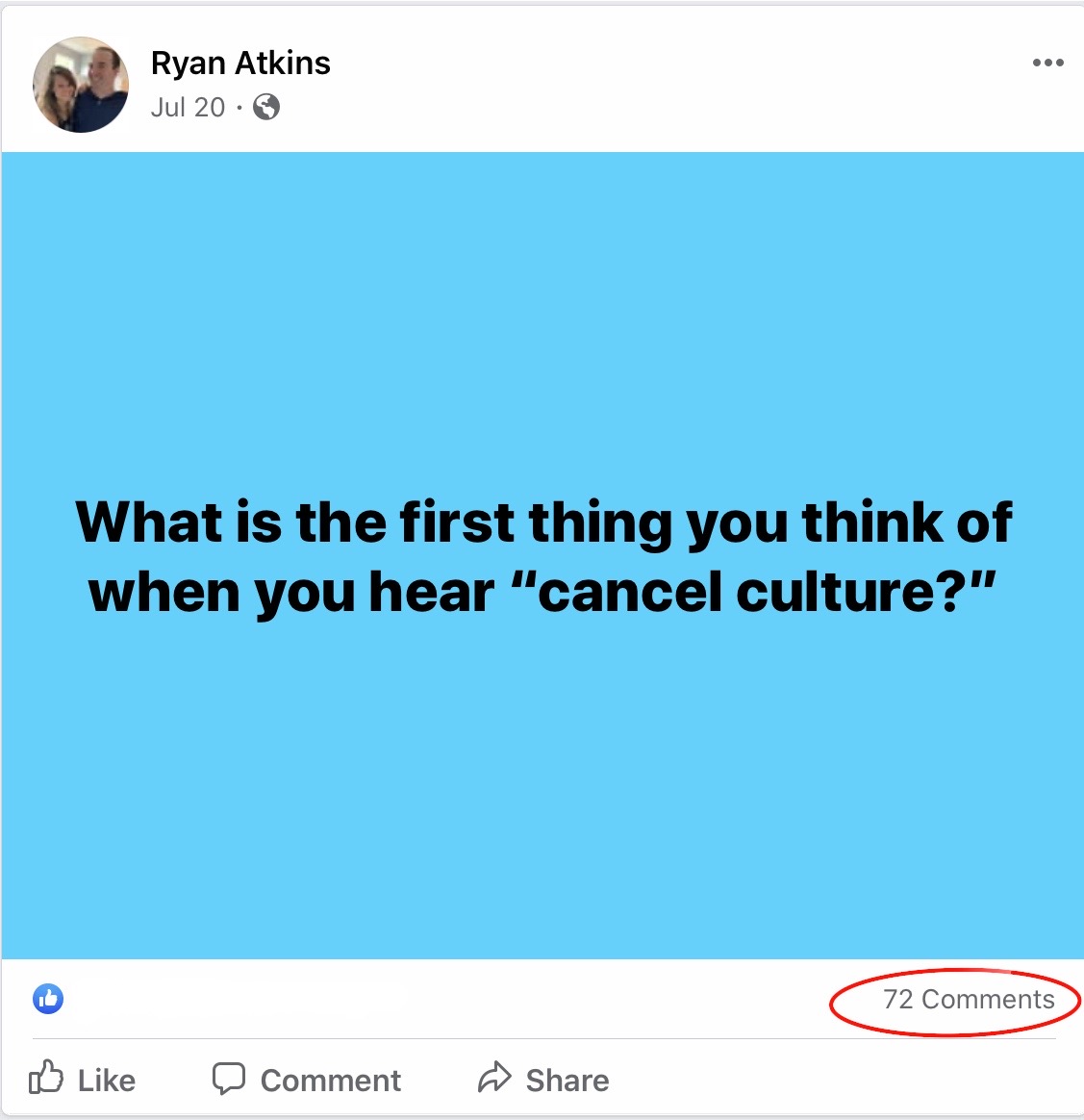
The one thing no one is saying about cancel culture
-
By Ryan Atkins
- On Jul 28, 2020
- 6 Comments
- In Life
Have you ever posted something on social media and immediately regretted it?
I have done it before and this week I nearly did it again.
To get some ideas for a blog post, I dropped this grenade last week on Facebook and quickly realized I needed to give some deeper thought to this subject.

I presume I was a bit naïve about how partisan this topic would be.
However, I do not entirely understand how or why this is the case.
Republicans and Democrats actually agree on something
Barack Obama has chided those who judge others ruthlessly with hashtags and virtue signaling under the guise of “activism.” Donald Trump has likewise negatively incorporated these buzzwords into his messaging.
These two men might use different methods of communicating this message, but if two people on polar opposite sides of the political spectrum are drawing the same conclusion, is this really a partisan issue?
What is cancel culture anyway?
“Cancel culture” is used to describe individuals or companies who face swift public backlash and boycott over offensive statements or actions. Since the term “offensive” can range from describing a mild slight to something incredibly vile, this ambiguous topic means immensely different things to different people (which I learned quickly from my Facebook post).
Seeing celebrities, politicians, teachers, leaders, and everyone in between on both sides of the political spectrum dragged out into the court of public opinion to be verbally flogged by the masses and ultimately cast aside seems to be the norm these days.
Some believe it is a reasonable way to shed light on injustices. To others, it is an extreme overreaction in the court of public opinion.
Me? I find myself stuck between the two.
Our society needs justice. Crimes should be punished. Evildoers should face consequences for their actions.
Our society also needs grace. Forgiveness. Understanding. A humble reminder we have all needed second chances.
Our current culture often feels like it only allows for choosing one or the other, but I do not want one without the other.
Making it personal
I cannot help but imagine myself in the shoes of those who are being dragged out for public humiliation. I find myself cringing at the thought of every mishap and indiscretion from my past out in the open for the world to see.
I have lied. I have cheated. I have spouted derogatory terms. I have stolen. I have lusted. I’ve been prideful. I could keep going…

What are we to do in a world where any misstep or indiscretion from the past or present might be revealed at any moment to delegitimize us, discredit us, and tarnish our reputation?
The day of ultimate judgment is coming
All of this got me thinking about the day that I will stand before God.
Jesus confirmed that every one of us will have to give account for our lives on the day of judgement. Every misstep, lapse of judgment, indiscretion, and blatantly selfish decision will be laid bare. Considering he also said, “Be perfect as your heavenly Father is perfect,” this should get our attention.
However, instead of forcing me to defend my every fault, Jesus came to take on the punishment that should have been mine. His death and resurrection offers me a concrete hope to rest on the base of supreme judgment. The ultimate acquittal offered freely, no questions asked, no justification required.
Because of this, when the day comes for me to stand before God, rather than shaming me for my choices, he will lift up my face and welcome me into his presence with a clean slate. Personally, I prefer this option to having every regretful act and thought from throughout my life meticulously analyzed, dissected, and questioned.
God said that David—a man who committed adultery and then had the woman’s husband murdered—was a man after his own heart. It is difficult to wrap our heads around how quickly God was willing to forgive David when he acknowledged his wrongdoings. Were there repercussions for murdering a man and living with his wife? Absolutely. Immense ones. But that did not mean David’s life was snuffed out, never to be worthy of being in God’s presence again.
The good news we all desperately need
Contrary to the culture we live in, God doesn’t simply “cancel” us every time we screw up. I am thankful that no one is beyond redemption, including me. Elevating our own sense of justice above God’s seems rather arrogant to me.
History is filled with flawed people who are just like you and me. The world we live in consists of over 7 billion people of different backgrounds, beliefs, values, and dreams. Eventually, at some point, every single one of us will fail our culture’s litmus test of what is “acceptable.”
Every time I hear about the latest person being “canceled,” it will serve as a reminder to be thankful for the sacrifice Jesus made on my behalf.
No matter which side of the debate you reside on, that is some great news.
—-
Check out the video below to see some (satirical) examples of “canceling”:



Beautiful. Thank you.
Thanks for reading Mindy!
Well said.
Especially: “Elevating our own sense of justice above God’s seems rather arrogant to me.”
The thing that is also interesting with today’s cancel culture … I was told in school that you can’t just people in the past by today’s standards. Amen to that.
I am glad ultimate judgment is not in my hands. I would be pretty terrible at it. Do you think schools are still teaching the same thing?
Hi Ryan!🙋🏼♀️ I always enjoy reading your blogs, so thank you for writing them! I love how you have such faith as I share that with you!
Amen!